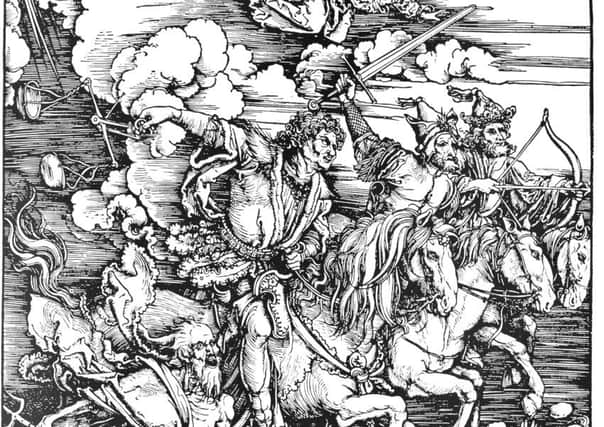Book review: The Four Horsemen, by Richard Dawkins, Daniel Dennett, Sam Harris and Christopher Hitchens


Alas, it turns out to be an exercise in the art of make-booking; a transcription of the only time the four all appeared on a platform together with penny-a-word extras from the three who are still in our sublunary sphere. To make things worse, there is an introduction by Stephen Fry – the unthinking person’s idea of an intellectual – which is both fawning and incorrect. He states, for example, that the following pages show that “their breadth of scriptural and theological knowledge is impressively on display in the pages to come”. My copy must have lacked some pages.
They certainly know about rabble-rousers and morons and literalists and idiots, but as for scripture or theology, precious little. Even the subtitle has an element of overstatement. Did these four “spark an atheist revolution”? Do we not consider the thought of Hobbes, Hume, Voltaire and Nietzsche part of a growing sense of what Matthew Arnold called the Sea of Faith’s “melancholy, long, withdrawing roar / Retreating, to the breath / Of the night-wind, down the vast edges drear / And naked shingles of the world”?
Advertisement
Hide AdAdvertisement
Hide AdAs a document of their conversation in September 2007, at a conference of the Atheist Alliance International in Washington DC, this is a document of some worth. There are differences between the writers; but overall there is a dreadful sense of mutual appreciation and of comradely back-slapping. There is also a strange tetchiness. The chat – debate would be to misuse the word – begins with them kvetching about being described as arrogant and overweening, when, of course, the really arrogant ones are the believers.
It takes a neck of brass to complain that someone calls you arrogant when you – as Richard Dawkins does – write: “It isn’t that theologians deliberately tell untruths. It’s as though they just don’t care about the truth; aren’t interested in truth; don’t even know what truth means; demote truth to negligible status compared with other considerations.”
Perhaps Dawkins needs a lesson in basic philosophy. What is the truth status of a statement such as “A unicorn has two horns”. Of course, all our images of unicorns have a single horn, so it is false; but unicorns don’t exist so how could the statement even be meaningful? There is a difference between a hypothesis yet to be disproved and the truth-to-oneself. Yet Dawkins cleaves to the idea of a truth, of which he is the most humble arbiter. On authority this is especially bizarre. Don’t trust the priest because he has no authority, but do trust me because I know my friend checked his footnotes.
As for the rest: Christopher Hitchens is by far the most amenable and conciliatory; Daniel Dennett, though strident, shows a sensitivity towards the why of belief and Sam Harris is basically a schoolboy debater who preens: “If there is a God, how come there is a Zika virus?” It reminded me of the old Monty Python song – “All things sick and cancerous / All evil great and small / All things foul and dangerous / The Lord God made them all.” That is about the level of his argument.
The best parts of this book are around two topics. Would the participants want religion to wither on the vine and just disappear? On this, Hitchens is by far the most engaged. Secondly, should there be a differentiation between religions: is Islam “worse” that Christianity? Are Quakers better than Hasidic Jews? Again, there is some intellectual traction here. Although, it ought to be said, events overtake books. No doubt they could not know that while they said that imagining a Buddhist committing a terrorist offence was hard, they would live to see the atrocities towards the Rohingya in Myanmar. (They might, given they are so clever, have looked at the beliefs of Phra Kittiwuttho in the 1970s). And when you read Dennett say that science proves that any politician “would be seriously diminished by a reputation for extremism… it helps mightily to have others a little further out there, visible and undaunted”. I wonder what he makes of the current incumbent of the White House. I could quibble further – Dawkins at one point claims DNA is universal then suddenly speculates that alien species might replicate it by 3D printing (it’s universal, or it ain’t). At least this has the humane, rebarbative, constantly questioning voice of Hitchens, like an echo.
There are two points on which I would finish. Firstly, there is very little about ethics here. Finishing the book, my mind was drawn to the difference between Dietrich Bonhoeffer, a truly great theologian, who was murdered by Hitler’s SS for opposing the regime, and his dark counterpart, Wernher von Braun, who developed the V2 and skipped off to America under Operation Paperclip. Science and Religion are not always singing from the same hymn sheet, in terms of morality.
Secondly, the words of the Calvinist theologian Theodore Beza in the 16th century: “The Church is an anvil that has worn out many hammers.” - Stuart Kelly
Book review: The Four Horsemen, by Richard Dawkins, Daniel Dennett, Sam Harris and Christopher Hitchens, Bantam Press, £9.99